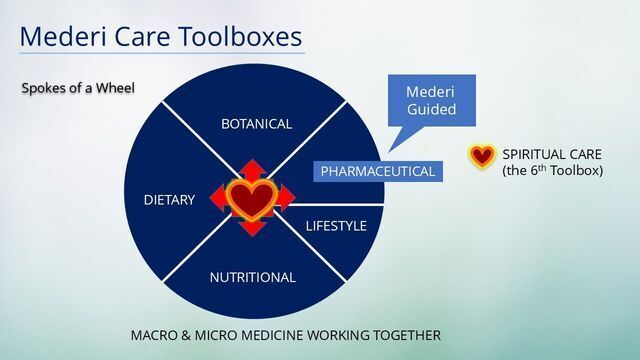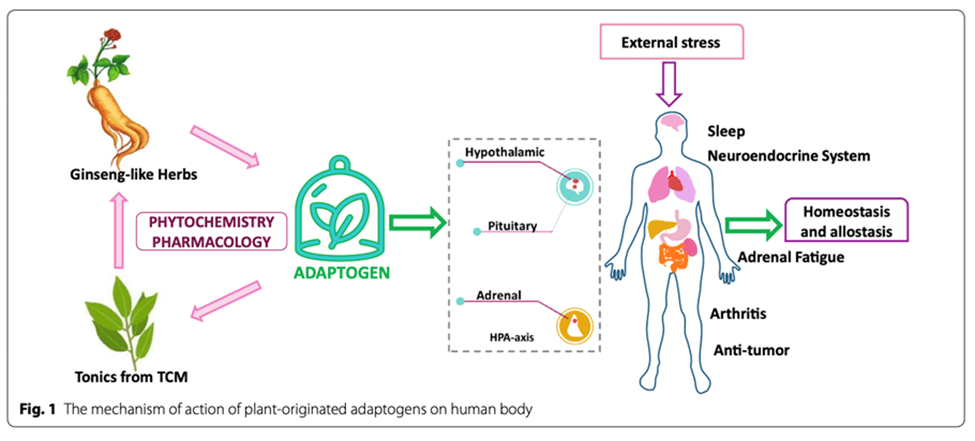Adaptogens, Hormesis, Bioregulatory Systems Medicine, and Network Pharmacology

Life on Earth has survived volcanos, ice ages, and asteroids through one crucial mechanism: adaptation. Humans, in particular, demonstrate remarkable adaptability, thriving in diverse conditions across the planet. This biological phenomenon is known as "hormesis."
Consider the unique adaptability of humans:
- We inhabit a wide range of environments, from the Arctic to deserts, jungles, seas, and barren wastelands
- Our diet encompasses an extensive variety of foods
- We possess the ability to reconstruct our living environments to an unparalleled degree
As Charles Darwin aptly stated, "It is not the strongest or the most intelligent of the species that survives. It is the one that is most adaptable to change."
Hormesis: The Key of Adaptation
The pillars of my approach to optimal health are to enhance adaptation, energy transfer efficiency, protection, and hormonal health. While adaptation is perhaps the most crucial, these elements are interconnected within a complex network. Therefore, the most effective approach to health supports the body's network, enhancing strength and the ability to self-regulate at molecular, cellular, and organ system levels.

Adaptogenic formulas are the first step in building and enhancing robust health, and the most important supplemental support you can provide to your body. Every other supplement you take should be secondary to adaptogenic formulations. Our approach to health and healing is dynamic and responsive, recognizing that what truly defines us as living beings is our body's ability to respond to stimuli. This life-force activates and regulates all components of energy transfer, constantly adapting based on the wisdom of our internal network.
Contemporary medicine often views the body in a fragmented manner, focusing on individual systems, parts, genes, and microbiomes. However, complex diseases are typically polygenic and multifactorial. A more holistic approach, particularly utilizing plant medicines that are pleiotropic, gentle, and nourishing, can assist in auto-regulation and provide comprehensive benefits.
Thinking Outside the Current Medical Model
Herbal formulations contain multiple components that target various sites, synergistically benefiting a range of pathways. Through many years of clinical practice, I’ve realized that trying to fit herbal medicine into the current conventional model isn’t possible or appropriate. This realization led me to the develop the Mederi Care model, a new holistic approach rooted in botanical medicine, nutritional supplementation, food as medicine, lifestyle modifications, and spiritual care.
The molecular pathways governing human disease consist of complex, overlapping networks. The emerging paradigm of "network medicine" aims to understand the static position of molecules in relation to their neighbors and the unique flux of information through these networks. This approach offers insights into pathogenic behavior that traditional methods often fail to recognize.

Bioregulatory Systems Medicine
Bioregulatory Systems Medicine (BrSM) is a comprehensive, innovative approach that embraces the complexity of diseases by supporting autoregulation and addressing underlying dysregulating biological networks. The Mederi Care approach aims to improve patient outcomes by enhancing their autoregulatory capacity through botanical and nutritional medicine applied in a gentle, synergistic manner.
Network Pharmacology: A New Perspective on Herbal Formulations
Network pharmacology, influenced by the holistic theories of Traditional Chinese Medicine (TCM) and other herbal medicine systems, offers a new way to understand the relationships between biological systems, drugs, and diseases from a network perspective. This approach aligns with the holistic pattern differentiation theory of TCM and Mederi medicine.

Mitochondrial Network Medicine
The mitochondrial network maintains a dynamic balance of processes known as mitochondrial dynamics. Mitochondria interact with almost every other cellular membrane, influencing all cellular functions. This interconnectedness highlights the importance of a holistic approach to health.
The Power of Adaptogens
Adaptogens, first described by Soviet scientist Lazarev in 1940, are plant-derived compounds that non-specifically enhance human physiology. The non-specific response mode, especially the hormone response mode, occurs when homeostasis is not the driving force. Adaptogens form the basis of the body's response to the external environment, acting on both the immune system and the stress response system, as shown below.

(image: Panossian A, Wikman G, Wagner H. Plant adaptogens. III. Earlier and more recent aspects and concepts on their mode of action. Phytomedicine. 1999 Oct;6(4):287-300. https://pubmed.ncbi.nlm.nih.gov/10589450/)
The increasing interest in network pharmacology and traditional herbal medicine is evident in the growing number of scientific publications on the subject. Understanding network pharmacology and Bioregulatory Systems Medicine forms the foundation of Mederi Care, a harmonious healing system gaining well-deserved recognition in the medical community.
Conclusion: The Future of Integrative Medicine
As we've explored throughout this article, the concepts of adaptogens, hormesis, Bioregulatory Systems Medicine (BrSM), and network pharmacology are revolutionizing our approach to health and healing. These interconnected paradigms offer a more holistic, nuanced understanding of the human body and its interactions with the environment and therapeutic interventions.
The growing body of research in these areas points to a future where medicine is more personalized, integrative, and effective. By embracing the complexity of biological systems and leveraging the power of adaptogens and other natural compounds, we can support the body's innate ability to heal and maintain balance.
Key takeaways from our exploration include:
- The importance of adaptation in human health and survival
- The role of hormesis in strengthening our biological systems
- The potential of adaptogens in supporting overall health and resilience
- The promise of Bioregulatory Systems Medicine in addressing complex, multifactorial diseases
- The insights gained from network pharmacology in understanding herbal formulations and their effects on the body
As we move forward, it's crucial that both practitioners and patients remain open to these evolving concepts. By integrating traditional wisdom with cutting-edge scientific understanding, we can create a more comprehensive, effective approach to health and wellness.
The Mederi Care model, rooted in these principles, represents a step towards this integrative future. As research continues to unfold, we can expect even more exciting developments in the field of adaptogenic medicine and network-based approaches to health.
Ultimately, the goal is to empower individuals with the knowledge and tools to support their body's natural healing processes, fostering a state of robust health and resilience in the face of life's many challenges.
Join the Mederi Center community by signing up for our email list! We send several emails a month with product promotions for patients, practical tips for healthy living, blogs written by our practitioners, information about events, and other news. You can unsubscribe at any time.
Works Consulted
- Chan SY, Loscalzo J. The emerging paradigm of network medicine in the study of human disease. Circ Res. 2012;111(3):359-374. https://www.ncbi.nlm.nih.gov/pmc/articles/PMC3425394/
- Lila MA. From beans to berries and beyond: teamwork between plant chemicals for protection of optimal human health. Ann N Y Acad Sci. 2007 Oct;1114:372-80. https://pubmed.ncbi.nlm.nih.gov/17986598/
- Corning PA. “The synergism hypothesis”: On the concept of synergy and its role in the evolution of complex systems. J Soc. Evol Syst.1998;21(2):133–72. https://www.sciencedirect.com/science/article/abs/pii/S106173610080003X
- Adams LS, Seeram NP, Hardy ML, Carpenter C, Heber D. Analysis of the interactions of botanical extract combinations against the viability of prostate cancer cell lines. Evid Based Complement Alternat Med. 2006 Zhou X, Seto SW, Chang D, Kiat H, Razmovski
- Naumovski V, Chan K, Bensoussan A. Synergistic Effects of Chinese Herbal Medicine: A Comprehensive Review of Methodology and Current Research. Front Pharmacol. 2016 Jul 12;7:201. https://pubmed.ncbi.nlm.nih.gov/27462269/
- Wagner H. Synergy research: approaching a new generation of phytopharmaceuticals. Fitoterapia. 2011 Jan;82(1):34-7. https://pubmed.ncbi.nlm.nih.gov/21075177/
- Bioregulatory Systems Medicine. White Paper. Published February 2019 – Copyright © Biologische Heilmittel Heel GmbH. Rights
- Reserved. https://www.bioregulatory-systems-medicine.com/en/whitepaper/detail/bioregulatory-systems-medicine-whitepaper
Kong DX, Li XJ, Zhang HY. Where is the hope for drug discovery? Let history tell the future. Drug Discov Today. 2009 Feb;14(3-4):115-9. https://pubmed.ncbi.nlm.nih.gov/18687410/ - Li S. Framework and practice of network-based studies for Chinese herbal formula. Zhong Xi Yi Jie He Xue Bao. 2007 Sep;5(5):489-93. https://pubmed.ncbi.nlm.nih.gov/17854545/
- Zhang R, Zhu X, Bai H, Ning K. Network Pharmacology Databases for Traditional Chinese Medicine: Review and Assessment. Front Pharmacol. 2019 Feb 21;10:123. https://pubmed.ncbi.nlm.nih.gov/30846939/
- Pijuan J, Cantarero L, Natera-de Benito D, Altimir A, Altisent-Huguet A, Díaz-Osorio Y, Carrera-García L, Expósito-Escudero J, Ortez C, Nascimento A, Hoenicka J, Palau F. Mitochondrial Dynamics and Mitochondria-Lysosome Contacts in Neurogenetic Diseases.Front Neurosci. 2022 Jan 31;16:784880. https://pubmed.ncbi.nlm.nih.gov/35177962/
- Tian J, Huang Y, Wu T, Huang HD, Ko KM, Zhu BT, Chen J. The Use of Chinese Yang/Qi-Invigorating Tonic Botanical Drugs/Herbal Formulations in Ameliorating Chronic Kidney Disease by Enhancing Mitochondrial Function. Front Pharmacol. 2021 Jun 24;12:622498. https://pubmed.ncbi.nlm.nih.gov/34248614/
- Liao LY, He YF, Li L, Meng H, Dong YM, Yi F, Xiao PG. A preliminary review of studies on adaptogens: comparison of their bioactivity in TCM with that of ginseng-like herbs used worldwide. Chin Med. 2018 Nov 16;13:57. doi: 10.1186/s13020-018-0214-9. https://pubmed.ncbi.nlm.nih.gov/30479654/
- Panossian A, Wikman G, Wagner H. Plant adaptogens. III. Earlier and more recent aspects and concepts on their mode of action. Phytomedicine. 1999 Oct;6(4):287-300. https://pubmed.nc

Meet Donnie Yance!
Donnie Yance is an internationally known master herbalist and nutritionist, and the author of Herbal Medicine, Healing and Cancer and Adaptogens in Medical Herbalism: Elite Herbs and Natural Compounds for Mastering Stress, Aging and Chronic Illness. After decades of extensive research and clinical practice, he developed an integrative approach to health and healing called the Eclectic Triphasic™ Medical System (ETMS), referred to as Mederi Care. Donnie is also the founder Mederi Academy, as well as the founder and formulator of Natura Health Products, a therapeutic-grade botanical and nutritional supplement line. These products have made a significant contribution to his tangible success in improving the health of his patients.
Learn more about Donnie Yance >>
Become a patient >>


